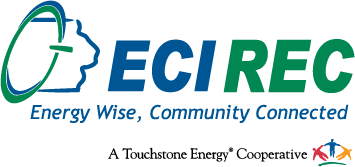What is it?
Net metering is a means of encouraging consumers to install renewable energy generators at their homes, businesses, or farms. Net metering policies or regulations can vary from state to state and from county to county. Essentially, net-metering is a way of subsidizing the installation of renewable energy generation.
Most generators using renewable resources do not generate a constant amount of electricity. This is particularly true of wind and solar power. The wind does not blow all of the time, and the sun does not shine at night or with the same intensity during daylight due to cloud cover. This means that renewable energy generators sometimes do not generate enough power to supply your needs, so you purchase power from your electric utility. At other times you generate more electricity than you can use. At these times you want to sell the excess electricity to your electric utility, such as East-Central Iowa REC.
How does it affect net metered electric bills?
What should ECI REC pay you for this excess electricity that you export to our distribution lines? We would gladly pay you our “avoided cost.” This is what our energy supplier (CIPCO) can purchase electric power for on the “spot market.” CIPCO re-calculates that number each year.
How does net metering affect other members?
The challenge with this system is that members who utilize net metering are not paying the same share of maintaining the distribution system or available capacity as members who do not have renewable generators. Members not using net metering are subsidizing those who do.
What is the future of net metering?
Net metering is one more factor in the very long list of variables that will impact the electric rates for us all over the next several years. Your Cooperative works hard to make sure we support a balanced approach to energy production, which we believe is the best way to manage the price we pay for power.
